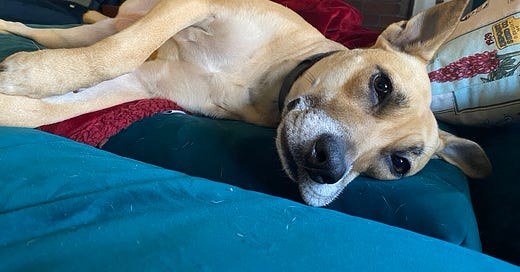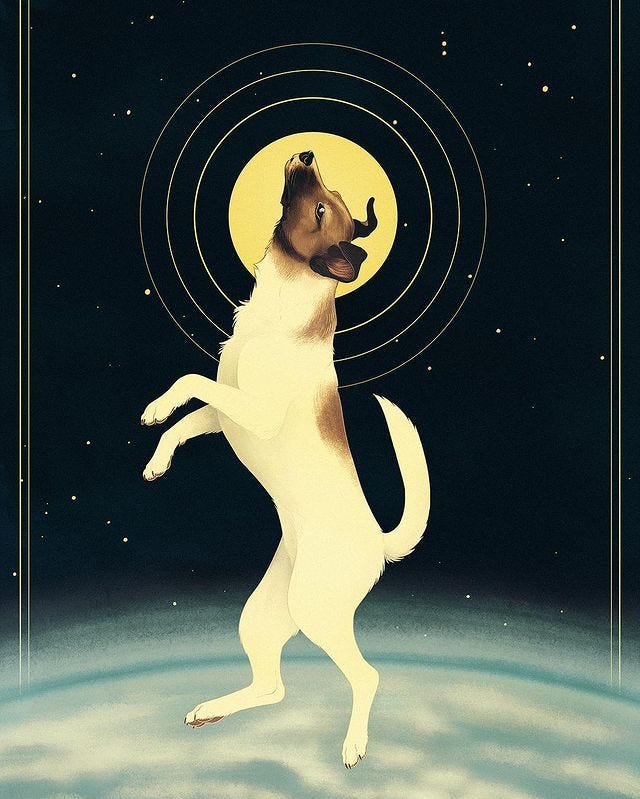My dog has been anxious since the minute my wife and I brought her home, two-and-a-half years ago. That anxiety has changed in shape and intensity over time, but it’s always been there.
After a recent bad bout of it, our vet recommended a pheromone collar: a disposable plastic ring that, when activated by body heat, seeps out the same soothing chemicals that mother dogs release to their puppies.
It seems to be working. And that makes me want to cry for reasons I have difficulty fully articulating. I suppose part of it is the sweetness of the relief that it’s granting her, a break from the high-octane jangle of nerves that seems to be her default setting while living on our busy street. Part of it is that I was unable to provide her that relief myself, that I couldn’t help her master those fears through my own demeanor or behavior. And maybe the biggest part is how it has forced me to rethink what I’ve been taught about dogs (and other animals, too): that once they’re weaned, they don’t “need” their mothers in the way we do. That my dog might have an inner child, or I guess inner puppy, that both cries out for comfort and can be assuaged by what is basically a round piece of plastic, feels so important and so pathetic all at once that I don’t know what to do with it.
I won’t be so gauche as to suggest that I know what it’s like to be a parent. But I do know, now, what it means to be responsible for the comfort and safety and happiness of another living thing. The depths of fear I am capable of. The heights of love, too.
Last Friday was Laika Day: the sixty-sixth anniversary of the launch of Sputnik 2, which carried onboard a stray mutt from the Moscow streets. Doomed to die on a one-way trip to the stars, a pioneer, a little dog who more than anything just needed to be taken care of, like all the rest do.
I find myself wondering about Laika quite a bit. What she might have felt or thought in those orbits of our planet. If she trusted her handlers, if she was happy in training, if she knew she was not coming back. Despite the stereotypes of the emotionless Soviet functionary there had to have been at least one person in the space program whose heart shattered into pieces as they loaded her into the vessel. Or maybe I just need to believe that. I think about all the animals we’ve sacrificed, as a species, in the service of our myths or our visions of the future or simply our own stupidity.1 I check in daily on my fears that we have sundered ourselves too completely from the natural world to ever return to a balance with it, that we will never again learn how to take only what is needed, and give of ourselves just as willingly as we demand of everything else. It is a prizefight between me and those fears and I haven’t lost it yet although I am frequently knocked down.
No matter the score, when I come home every day, I am granted anew the chance to love one small piece of that world as best I can. A little dog who needs whatever grace and compassion and kindness I have to give. I fail at that more often than I care to admit, and yet she wipes my slate clean daily and gives me another chance to help shepherd her through this anxious world. Any time I’m not feeling grateful enough for that, I think about Laika, the Church Grim of our earthly departed, her little nose pointed toward the stars, and I remember. I remember.
Thanks, as always, for reading. I’ll talk to you next time.
-Chuck
Reading up on one of my favorite birds the other day, the Steller’s jay, in light of the news that it’s due to be renamed, I learned that the Steller’s sea cow—described by and named for the same naturalist—was extinct within twenty-seven years of its discovery by Europeans. There is nothing in the world so unique that we can’t destroy it with the logic of our own greed, which tells us everything will be ours forever.






Your heart is like your dad's. Thank you. 💜
Beautifully written, as always. Thanks Chuck